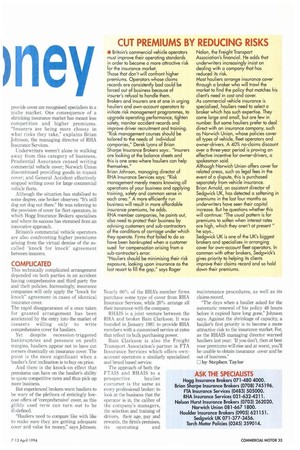Protection M
Page 34

Page 35

If you've noticed an error in this article please click here to report it so we can fix it.
)ne
The insurance industry caught a E6.8bn cold in 1991 and since then vehicle insurance has been hard to come by at a reasonable price— some companies now refuse to insure any CV fleets. The road to the best deal on premiums is made smoother by improved operational skills and training in risk reduction.
Britain's commercial vehicle insurance industry has come full circle since the mid-1980s when insurers sought premium to boast investment.
A policy of pursuing market share depressed rates while at the same time claims and overheads rose. The result was failure and losses.
Today this sector has reduced availability of insurance capacity, the result of the insurance industry's horrendous £6.8bn losses of 1991.
What this means is that a haulier with a bad claims record is finding it increasingly difficult to buy cover. In the past, even hauliers with an abysmal claims record could obtain insurance, albeit at a high premium. But this is no longer automatically the case as underwriters become more and more selective in relation to the risks they are prepared to carry.
UNPRECEDENTED
The industry-wide losses of the early 1990s led several underwriters to stop writing commercial vehicle cover. This, as an industry figure later remarked, was unprecedented.
There are now only six Lloyd's syndicates offering haulage-related commercial vehicle cover. The small number of underwriters continuing to provide cover are recognised specialists in a niche market. One consequence of a shrinking insurance market has meant less competition and higher premiums. "Insurers are being more choosy in what risks they take," explains Brian Johnson, the managing director of RHA Insurance Services.
Underwriters weren't alone in walking away from this category of business, Prudential Assurance ceased writing commercial vehicle cover; Norwich Union discontinued providing goods in transit cover; and General Accident effectively stopped writing cover for large commercial vehicle fleets.
Although the situation has stabilised to some degree, one broker observes: "It's still dog eat dog out there." He was referring to the provision of cover for fleet operators, in which Hogg Insurance Brokers specialises and where its success has stemmed from an innovative approach.
Britain's commercial vehicle operators are also confronting higher premiums arising from the virtual demise of the socalled 'knock for knock' agreement between insurers.
COMPLICATED
This technically complicated arrangement depended on both parties in an accident having comprehensive and third party fire and theft policies. Increasingly, insurance companies will only apply the "knock for knock" agreement in cases of identical insurance cover.
The rapid disappearance of a once taken for granted arrangement has been accelerated by the entry into the market of insurers willing only to write comprehensive cover for hauliers.
Yet despite recession-triggered bankruptcies and pressure on profit margins, hauliers appear not to have cut corners drastically on insurance cover. The point is the more significant when a haulier's first inclination is to buy on price.
And there is the knock-on effect that premiums can have on the haulier's ability to quote competitive rates and thus pick up more business.
But experienced brokers warn hauliers to be wary of the plethora of enticingly lowcost offers of 'comprehensive' cover, as this glibly used term can turn out to be ill-defined.
"Hauliers need to compare like with like to make sure they are getting adequate cover and value for money," says Johnson.
Nearly 60% of the RHA's member firms purchase some type of cover from RHA Insurance Services, while 20% arrange all their insurance with the company.
RHAIS is a joint venture between the RHA and broker Bain Clarkson. It was founded in January 1981 to provide RHA members with a customised service at rates that reflect its bulk purchasing power.
Bain Clarkson is also the Freight Transport Association's partner in FTA Insurance Services which offers ownaccount operators a similarly specialised and broad-based service.
The approach of both the FTAIS and RHAIS to a
prospective haulier customer is the same as every professional broker: to look at the business that the operator is in, the calibre of the company's managers, the selection and training of drivers, their age, pay and rewards, the firm's premises, its operating and maintenance procedures, as well as its claims record.
"The days when a haulier asked for the automatic renewal of his policy 48 hours before it expired have long gone," Johnson says. Against the shrinkage of capacity, a haulier's first priority is to become a more attractive risk to the insurance market For, as the RHAIS managing director warned hauliers last year: 'If you don't, then at best your premiums will rise and at worst, you'll be unable to obtain insurance cover and be out of business."
by Stephen Taylor


















































































